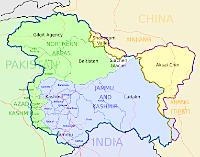Lost in the news cycles of presidential politics, the Olympic Games and the Iraq and Afghanistan wars is a brewing crisis in South Asia. The United States' strategic posture toward South Asia has largely focused on terrorism in Afghanistan and Pakistan and on nuclear proliferation. This approach has largely ignored the historical conflict over Jammu and Kashmir, which has sparked two major hot wars in the last 60 years. Growing unrest in Kashmir is threatening to cause open conflict between India and Pakistan once again, and American policy makers can't afford to sit this one out. For almost seven years, the situation in Kashmir has been relatively uneventful. India and Pakistan have taken incremental steps to enhance confidence and interactions across the Line of Control in hopes of neutralizing prospects for conflict. Although cross-border skirmishes have been relatively frequent, both nations have largely ignored them in hopes of giving the peace process time to follow its course. Unfortunately, Pakistan's weak central government has been unable to control radical terrorist groups, which have recently caused unrest in Kashmir. The relative calm that existed in Kashmir over the past few years is quickly receding as Pakistani government-supported separatist groups are once again itching for independence. In the past several days, dozens of people have been killed in the region following a decision by the state government of Indian-controlled but Muslim-majority Jammu and Kashmir state to award land-use rights to a Hindu congregation. This decision sparked a violent uprising against Hindu minorities in Gilgit -- a Pakistani controlled part of Kashmir -- which were followed by counterattacks from conservative Hindu groups against Muslims in Indian-controlled Kashmir. These disturbances culminated in full-scale riots and protests and the death of Abdul Aziz Sheikh, a leading anti-Indian secessionist figure. The potential for continued widespread violence is great.
A Ticking Time Bomb: U.S. Officials Should Not Forget Kashmir

